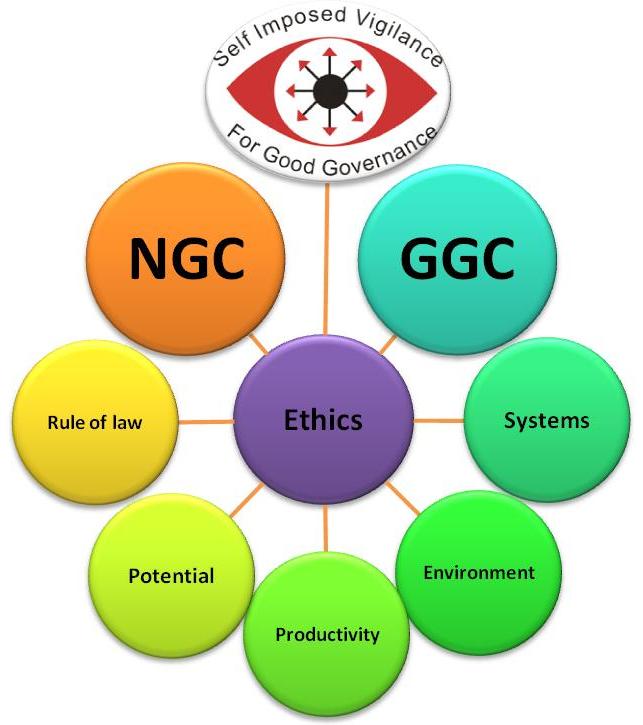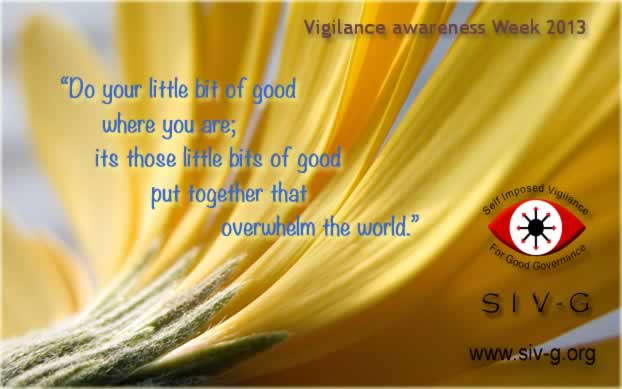National Governance Corps (NGC) is an initiative of SIV-G (Self Imposed Vigilance for Good Governance) on the lines of National Cadet Corps (NCC) / National Social Service (NSS). NGC was first launched in December 2008 in DAV Girls Senior Secondary School, Gopalapuram, Chennai, India coinciding the UN Anti-Corruption Day. Ms. Kruthika Prakash, a student of IX standard became the first NGC.
Shri N. Vittal, IAS(Retd), former Central Vigilance Commissioner (CVC) administered the Pledge to the first NGC. Self-Commitment Pledge is available here.(English / Hindi)
Subsequently, an article was also published in the leading Newspapers on NGC in March 2009.
After the press coverage, BEML Ltd., a public sector undertaking in Bangalore adopted NGC as a CSR project and decided to introduce in BEML School in KGF as a pilot project (Please refer to the report submitted by CVO, BEML to CVC on the observance of Vigilance Awareness Week 2009). Subsequently, the ITI LTD., which runs three schools in Bangalore, has also adopted NGC in January 2010.
Earlier, the Loyola College, Chennai had adopted NGC in a different form. In fact, they have created a SIV-G Forum under the Forum for Intellectual Advancement.
Realizing the potential of SIV-G and NGC, Suresh Govindarajan, Founder, SIV-G was invited to deliver a TED talk during March 2010 whose basic theme is “ideas worth spreading”. Glimpses of Tedx talks are available here.
Founder, SIV-G was consulted by Central Vigilance Commission while evolving National Anti Corruption Strategy for India. Consultant appointed for this purpose had a detaileddiscussion with Mr. Suresh Govindarajan, Founder, SIV-G about the National Governance Corps (NGC) and expressed keenness to recommend adoption of NGC across the country in all schools. Subsequently, NGC made an entry in Gujarat and a school in Vadinar run by Kandla Port Trust adopted NGC.
Nevertheless, as may be seen from the NGC Handbook, SIV-G visualized NGC to ultimately become a Global Governance Corps (GGC) and there are good signs that it would become a reality soon.
How it was done?
With the experience and exposure as an anti-corruption expert, good governance practitioner and an ISR (Individual Social Responsibility) promoter, Mr. Suresh Govindarajan came out with a law called “Suresh’s Law of Corruption Dynamics” and presented this Law in the University of Passau, Germany in October 2005. Incidentally, the University of Passau is known for bringing out the Corruption Perception Index for the Transparency International, Berlin. On further invitation from the University of Passau for their Lecture on Economics of Corruption in 2006, he also presented SIV-G : Self Imposed Vigilance for Good Governance, which is an Axiom to the Suresh’s Law of Corruption Dynamics. While the Law identifies the problem, the SIV-G provides the solution, i.e. realizing good governance through self-vigilance and good practices.
In order to reach out to the youngsters, particularly the students, a website www.siv-g.org was launched in 2007. With the support of some NGOs, periodically online essay contests were organized on themes such as integrity, Good Governance, importance of ethics and values and so on using the website. These online contests were helpful in identifying the students who have the spark to carry on the mission of SIV-G in launching the NGC. Some of the press reports in this regard are available at http://www.siv-g.org/index.php/press-reports-mainmenu-44/35-press-reports/51-press-report-on-online-essay-contest
How does NGC work?
NGC, which is visualized to become a Global Governance Corps (GGC) ultimately, works through the following six groups. These groups were identified in the Suresh Law of Corruption Dynamics, as the major factors, which determine good governance in any society.

Through the inspired youngsters, who take part in the online essay contest and win prizes or otherwise, the idea of launching NGC is mooted. Consequentially, the NGC launch happens in the following sequence of action:
1. Organising a meeting with the School authorities, in which the NGC concept would be presented and discussed. This will help in clarifying doubts, if any.
2. Identification of students who would become NGC and also a Mentor/co-ordinator from the school or outside the school.
3. Gather students for understanding the concept of NGC and formation of groups (this could be clubbed with s.no.1 also).
4. Organising a formal function in which the NGC Pledge could be administered.
5. Guidance and Review of NGC progress would be done through the Mentor.
6. Experience sharing between NGCs of different schools.
As per the scheme, every NGC of a School will have a Mentor either from the School or from the immediate local society, who preferably have strong feelings for the well being of humanity and have concern for the society/nation. There is good number of youngsters, particularly in the software industry who could be involved as Mentors.
It is a three-year program and each member will spend about six months in each group so that at the end of the program, they would have been exposed to all the factors that determine good governance. The activities in each group are divided in to three, viz., Inward activity, In-house activity and Outdoor activity. The details are available in the NGC Handbook.
The basic premise is to bring light, instead of cursing the darkness. This is the very essence of SIV-G and NGC is a part of this exercise to realize it.
Path ahead
The NGC should be adopted in all the schools across the country to realize its far-reaching effect. To start with, the government may immediately introduce in all the Schools run by the government. Later on, this could be extended to other schools. Also, the NGC could be made part of the Curriculum and included in the social science so that the students develop better understanding and which in turn will make the practice more effective.
NGC has a universal application. In the global village, it is worth emulating NGC in all countries so that NGC matures into GGC and the whole world could be benefited. It is not possible to make only a selected portion of the globe ‘corruption-free’, when the countries are interdependent and men and material move across the borders, thanks to globalization. Fortunately, there are positive signs. The East African Community and an NGO in Cameroon have shown interest in launching NGC.
Ultimately, NGC is an ideal model for the National Anti Corruption Strategy to adopt, as it is bound to make good citizens and human beings in the long run and thus would prevent corruption by default.
After all, what we sow, we reap!

